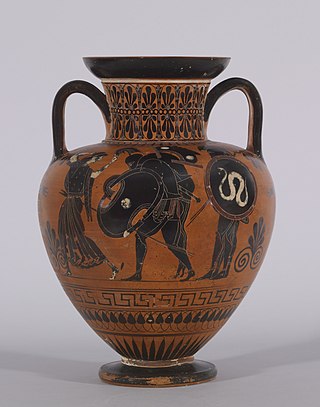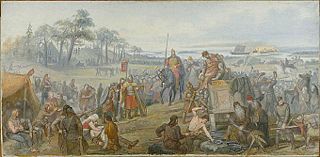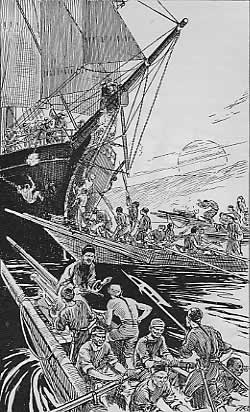Related Research Articles

In Greek mythology, Achilles or Achilleus was a hero of the Trojan War who was known as being the greatest of all the Greek warriors. The central character in Homer's Iliad, he was the son of the Nereid Thetis and Peleus, king of Phthia and famous Argonaut. Achilles was raised in Phthia along with his childhood companion Patroclus and received his education by the centaur Chiron. In the Iliad, he is presented as the commander of the mythical tribe of the Myrmidons.

Ajax or Aias is a Greek mythological hero, the son of King Telamon and Periboea, and the half-brother of Teucer. He plays an important role in the Trojan War, and is portrayed as a towering figure and a warrior of great courage in Homer's Iliad and in the Epic Cycle, a series of epic poems about the Trojan War, being second only to Achilles among Greek heroes of the war. He is also referred to as "Telamonian Ajax", "Greater Ajax", or "Ajax the Great", which distinguishes him from Ajax, son of Oileus, also known as Ajax the Lesser.

Baldr is a god in Germanic mythology. In Norse mythology, he is a son of the god Odin and the goddess Frigg, and has numerous brothers, such as Thor and Váli. In wider Germanic mythology, the god was known in Old English as Bældæġ, and in Old High German as Balder, all ultimately stemming from the Proto-Germanic theonym *Balðraz.

In Greek mythology, Hector is a Trojan prince, a hero and the greatest warrior for Troy during the Trojan War. He is a major character in Homer's Iliad, where he leads the Trojans and their allies in the defense of Troy, killing countless Greek warriors. He is ultimately killed in single combat by the Greek hero Achilles, who later drags his dead body around the city of Troy behind his chariot.

The Trojan War was a legendary conflict in Greek mythology that took place around the 12th or 13th century BC. The war was waged by the Achaeans (Greeks) against the city of Troy after Paris of Troy took Helen from her husband Menelaus, king of Sparta. The war is one of the most important events in Greek mythology, and it has been narrated through many works of Greek literature, most notably Homer's Iliad. The core of the Iliad describes a period of four days and two nights in the tenth year of the decade-long siege of Troy; the Odyssey describes the journey home of Odysseus, one of the war's heroes. Other parts of the war are described in a cycle of epic poems, which have survived through fragments. Episodes from the war provided material for Greek tragedy and other works of Greek literature, and for Roman poets including Virgil and Ovid.

The Argonauts were a band of heroes in Greek mythology, who in the years before the Trojan War accompanied Jason to Colchis in his quest to find the Golden Fleece. Their name comes from their ship, Argo, named after its builder, Argus. They were sometimes called Minyans, after a prehistoric tribe in the area.

Diomedes or Diomede is a hero in Greek mythology, known for his participation in the Trojan War.
In Greek mythology, Parthenopaeus or Parthenopaios was one of the Seven against Thebes, a native of Arcadia, described as young and outstandingly good-looking, but at the same time arrogant, ruthless and over-confident, although an unproblematic ally for the Argives.
In Greek mythology, Deiphobus was a son of Priam and Hecuba. He was a prince of Troy, and the greatest of Priam's sons after Hector and Paris. Deiphobus killed four men of fame in the Trojan War.

Diarmuid Ua Duibhne, also known as Diarmuid of the Love Spot, is a hero and demigod in the Fenian Cycle of Irish mythology, traditionally thought to be set in the 2nd to 4th century. He is the son of Donn, son of Duibhne of the Fianna, and Cochrann, daughter of Cathaír Mór. Diarmuid becomes the foster son and protégé of Aengus Óg, one of the Tuatha Dé Danann and the god of love, to the extent that a god of love can be said to exist in the corpus. He grows up to be a skilled warrior and a well-liked, valued member of the Fianna who on one occasion saves Fionn and his band by single-handedly slaying over three thousand enemies in battle.

Björn Ironside, according to Norse legends, was a Norse Viking chief and Swedish king. According to the 12th- and 13th-century Scandinavian histories, he was the son of notorious Viking king Ragnar Lodbrok and lived in the 9th century, between 855 and 858. Björn Ironside is said to have been the first ruler of the Swedish Munsö dynasty. In the early 18th century, a barrow on the island of Munsö was claimed by antiquarians to be Björn Järnsidas hög or Björn Ironside's barrow.

Dobrynya Nikitich is one of the most popular bogatyrs from the "Kievan" series of Russian folklore based on bylina originating from the area around the capital of the Kievan Rus, Kiev. Albeit fictional, this character is based on a real warlord Dobrynya, who led the armies of Svyatoslav the Great and tutored his son Vladimir the Great.

The Battle of Fýrisvellir was fought in the 980s on the plain called Fýrisvellir, where modern Uppsala is situated, between King Eric the Victorious and an invading force. According to Norse sagas, this force was led by his nephew Styrbjörn the Strong. Eric won the battle, and became known as "the Victorious".
In Greek mythology, Thoas, a king of Aetolia, was the son of Andraemon and Gorge, and one of the heroes who fought for the Greeks in the Trojan War. Thoas had a son Haemon, and an unnamed daughter.
Sharpe's Sword is a historical novel in the Richard Sharpe series by Bernard Cornwell. It is the fourth in the series, being first published in 1983, though the fifteenth chronologically. Set in the summer of 1812 including the Battle of Salamanca on 22 July 1812, the story follows Sharpe and his friend Sergeant Harper involved in espionage while hunting down the sadistic and highly dangerous Colonel Philippe Leroux.

In Greek mythology, Meriones was the Cretan son of Molus and Melphis or Euippe. Molus was a half-brother of Idomeneus. Like other heroes of mythology, Meriones was said to be a descendant of gods. As a grandson of Deucalion, Meriones' ancestors include Zeus, Europa, Helios, and Pasiphae, the sister of Circe. Meriones possessed the helmet of Amyntor, which Autolycus had stolen. He inherited the helmet from his father Molus and later gave it to Odysseus. Meriones killed seven men at Troy.
In Greek mythology, Acamas or Akamas, was the son of Trojan elder Antenor and Theano. He participated in the Trojan War, and fought on the side of the Trojans.

The Iliad is one of two major ancient Greek epic poems attributed to Homer. It is one of the oldest extant works of literature still widely read by modern audiences. As with the Odyssey, the poem is divided into 24 books and was written in dactylic hexameter. It contains 15,693 lines in its most widely accepted version. Set towards the end of the Trojan War, a ten-year siege of the city of Troy by a coalition of Mycenaean Greek states, the poem depicts significant events in the siege's final weeks. In particular, it depicts a fierce quarrel between King Agamemnon and a celebrated warrior, Achilles. It is a central part of the Epic Cycle. The Iliad is often regarded as the first substantial piece of European literature.

The North Star affair occurred in May 1861 when Chinese pirates attacked the British merchant ship North Star. Several men were killed in the incident, including a Royal Navy officer. The pirates escaped capture with 4,000 dollars' worth of gold.

In Greek mythology, Eurypylus ("Broadgate") was the son of Telephus, king of Mysia. He was a great warrior, who led a Mysian contingent that fought alongside the Trojans against the Greeks in the Trojan War. He killed Machaon, and was himself killed by Achilles' son Neoptolemus.
References
- ↑ Schmadel, Lutz D. (2007). "(2357) Phereclos". Dictionary of Minor Planet Names – (2357) Phereclos. Springer Berlin Heidelberg. p. 192. doi:10.1007/978-3-540-29925-7_2358. ISBN 978-3-540-00238-3.